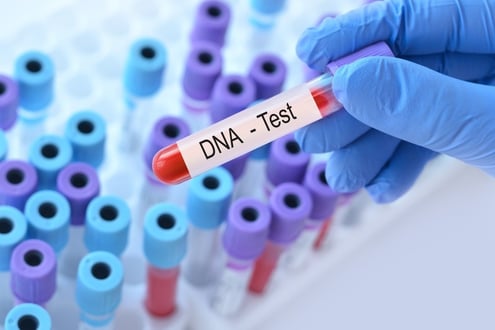Treatment for Breast Cancer
How do doctors decide on a treatment plan?
Doctors base their treatment recommendations on several factors, including:
- the of your cancer
- the subtype based on pathology
- genetic test results
- results
- how fast the cancer is growing or how likely it is to spread
- whether the cancer is newly-diagnosed or has recurred after one or more treatments
- your overall health
Make sure that you receive a copy of your records. Ask your doctor to explain your diagnosis, test results, , , prognosis and treatment recommendations in terms that you can understand. This will allow you to work with your doctor to choose a treatment plan that is right for you.
Most breast cancer is treated with one or more of the following treatments. Every treatment has potential risks and side effects. Before any new treatment or surgery, make sure your healthcare team tells you about what to expect.
Radiation therapy
Radiation therapy is used to treat breast cancer in the following ways:
- In early breast cancer to treat the breast and surrounding tissue after surgery to prevent recurrence.
- In people with breast cancer which has spread to their bones, brain or other sites to reduce the size of the tumor and manage pain or other symptoms.
Hormone therapy
Most people with cancers receive hormone therapy after surgery. The most common types of hormone therapies are:
- SERMs (selective receptor modulators) block cells from using . Example of common SERMs include tamoxifen and raloxifene.
- SERDs (selective receptor degraders) damage the receptors that allow cancer cells use to feed on . The SERDs with approval include Faslodex (fulvestrant), Inluriy (imlunestrant) and Oserdu (elacestrant).
- Aromatase inhibitors block cells from making . Examples of aromatase inhibitors include Arimidex (anastrozole), Femara (letrozole) and Aromasin (exemestane).
Chemotherapy
Chemotherapy may be used to treat breast cancer in the following ways:
- For early breast cancer, chemotherapy may be given before surgery to shrink the size of the cancer and number of affected. This is known as therapy.
- For early breast cancer, chemotherapy may be given after surgery to kill any remaining cancer cells that may have escaped the breast area. This is known as therapy.
- For people with breast cancer, chemotherapy may be given to keep the cancer from growing.
Get notified when updated information becomes available.
SIGN UP FOR CONTENT UPDATESTargeted therapy
is a type of cancer treatment designed to attack or kill cancer cells, while sparing normal cells as much as possible. They are designed to target abnormal proteins, receptors or genes that are found in cancer cells or the surrounding tissue. See our general section on for more information on different agents. See the tables below for a list of targeted therapies used to treat breast cancer.
PARP inhibitors
PARP inhibitors are a type of that works by blocking a protein that the body uses to repair damage. They were initially developed to treat cancers in people with an inherited or mutation.
- For breast cancer, two PARP inhibitors have received FDA-approval as for treating people with an inherited mutation:
- Lynparza ()
- ()
- For people with early breast cancer at high risk for recurrence:
- Lynparza may be used as treatment after chemotherapy in people with an inherited or mutation. Lynparza is approved for patients with high-risk, early breast cancer and an inherited or mutation.
Researchers are studying new ways to use PARP inhibitors to treat breast cancer, including:
- for people with an in a different gene that repairs damage (for example: , or ).
- for people who do not have an inherited gene mutation, but their tumor tested positive for an acquired mutation in a gene that repairs damage.
Visit our Featured Research section for more information.
for triple-negative breast cancers
- , that has progressed may be treated with the drug Trodelvy (sacituzumab govitecan).
for or HER2-low breast cancers
Medications that treat , HER2-low and HER2-ultralow cancers are called "anti-HER2 therapies." Commonly-used anti-HER2 therapies used to treat breast cancers include:
- Herceptin (trastuzumab)
- Perjeta (pertuzumab)
- Tukysa (tucatinib)
- Phesgo (pertuzumab, trastuzumab and hyaluronidase)
- Enhertu (T-DXd).
or advanced HER2-low or HER2-ultralow breast cancers may also be treated with the anti-HER2 drug Enhertu.
for hormone receptor-positive breast cancers
- advanced breast cancers are often treated with CDK4/6 inhibitors. CDK4/6 inhibitors target proteins found in some breast cancers called CDK inhibitors. The three CDK4/6 inhibitors approved for use in breast cancer are: Ibrance (palbociclib), Kisqali (ribociclib) and Verzenio (abemaciclib).
- breast cancers that test positive for a tumor called PIK3CA may be treated with the drug Piqray (alpelisib). PIK3CA is an acquired gene mutation found in some ER-positive breast cancers.
- The drug Truqap (capivasertib) combined with fulvestrant is approved to treat , advanced or breast cancer with a mutation in , PIK3 or AKT1 genes which recurred or got worse after standard hormone therapy.
Immunotherapy
Immunotherapies are cancer treatments that help the body’s immune system detect and attack cancer cells. Immune checkpoint inhibitors are a type of used to treat several types of cancer, including breast cancer. Some cancer cells can switch off the immune system. Immune checkpoint inhibitors are drugs that prevent this from happening. This allows the immune system to find, unmask and destroy cancer cells. Immune checkpoint inhibitors are approved for treating breast cancer in the following situations:
- Keytruda (pembrolizumab) is approved in combination with chemotherapy for treatment of that is or locally recurrent and unresectable that tests positive for a called .
- Keytruda is approved for the treatment of triple-negative breast cancer that is at high risk for recurrence. In this setting, Keytruda is used along with chemotherapy as therapy before surgery. Following surgery, Keytruda is continued alone.
See our general section on for more information on different types of . See the tables below for a list of immunotherapies used to treat breast cancer.
|
Name of Drug |
Cancer |
Indication |
|
Type of Agent |
|
Herceptin |
Early |
The treatment of breast cancer |
overexpression () |
Antibody targeting receptors |
|
Perjeta (pertuzumab) |
Locally advanced, inflammatory or early |
Combined with Herceptin (trastuzumab) and docetaxel as treatment before surgery () |
overexpression () |
Antibody targeting receptors |
|
Phesgo (pertuzumab, trastuzumab combined injection) |
Early |
|
overexpression () |
Antibody targeting receptors |
|
Keytruda (pembrolizumab) |
Early TNBC at high risk for recurrence |
Before surgery Keytruda is used along with chemotherapy as therapy. Following surgery, Keytruda is continued alone. |
Triple-negative (, ) |
Type of known as an |
|
Lynparza () |
Early breast cancer at high risk for recurrence |
Given for one year as after completion of or chemotherapy and local treatment (surgery and, or radiation) |
or inherited mutation () |
Type of known as a |
|
Kadcyla |
Early |
therapy for people with early breast cancer who still have disease after taxane and treatment with Herceptin |
overexpression () |
Antibody targeting receptors |
|
Kisqali
|
Early |
In combination with an aromatase inhibitor or Femara (letrozole) for the treatment of , , node-positive, 2 or 3 breast cancer at high risk of recurrence. |
, |
Type of known as a kinase inhibitor |
|
Verzenio
|
Early |
In combination with endocrine therapy (tamoxifen or an aromatase inhibitor) for the treatment of , , node-positive, early breast cancer at high risk of recurrence. |
, |
Type of known as a kinase inhibitor |
|
Name of Drug |
Cancer |
Indication |
|
Type of Agent |
|
Perjeta (pertuzumab) |
Locally advanced, inflammatory or early |
Combined with Herceptin (trastuzumab) and docetaxel as treatment before surgery () |
overexpression () |
Antibody targeting receptors |
|
Datroway (datopotamab deruxtecan-dlnk) |
Treatment for cancers that have progressed after hormone therapy and chemotherapy |
Hormone receptor position (), |
Antibody-drug conjugate (chemotherapy attached to antibody targeting TROP-2) |
|
|
Enhertu (fam-trastuzumab-deruxtecan-nxki) |
Treatment for people who have:
|
overexpression () |
Antibody-drug conjugate (chemotherapy attached to antibody targeting receptor) |
|
|
Enhertu (fam-trastuzumab-deruxtecan-nxki) |
Treatment for people who have () positive, HER2-low or HER2-ultralow breast cancer that came back or got worse after one or more hormone therapies in the setting. |
and HER2-low or HER2-ultralow |
Antibody-drug conjugate (chemotherapy attached to antibody targeting receptor) |
|
|
Enhertu (fam-trastuzumab-deruxtecan-nxki) |
|
Treatment for people with tumors that are HER2-low who:
|
HER2-low |
Antibody-drug conjugate (chemotherapy attached to antibody targeting receptor) |
|
Enhertu (fam-trastuzumab-deruxtecan-nxki) |
|
Treatment of unresectable or HER2-positive (including breast cancer) in people who have received prior systemic treatment and have no satisfactory alternative treatment options |
Antibody-drug conjugate (chemotherapy attached to antibody targeting receptor) |
|
|
Kadcyla |
|
For treatment in people whose cancer got worse after receiving Herceptin and chemotherapy in the following settings:
|
overexpression () |
Antibody targeting receptors |
|
Tukysa (tucatinib) |
In combination with Herceptin (trastuzumab) to treat cancer which has progressed after at least one prior treatment with an anti-HER2 treatment in the setting |
overexpression () |
known as a kinase inhibitor that targets receptors |
|
|
Trodelvy (sacituzumab govitecan-hziy) |
|
For breast cancer that progressed, recurred or did not respond to at least two previous lines of treatment |
Triple-negative (, ) |
Antibody-drug conjugate (chemotherapy attached to antibody found in ) |
|
Afinitor |
|
Combined with Aromasin (exemestane) for postmenopausal women with advanced breast cancer which progressed with Femara (letrozole) or Arimidex (anastrozole) |
and |
MTOR inhibitor (type of kinase inhibitor) |
|
Inluriyo |
Used alone to treat men or postmenopausal women with , breast cancer, which progressed after at least one line of hormone therapy therapy |
, with an ESR1 mutation |
Type of hormonal therapy known as SERD (selective receptor degrader or downregulator) |
|
|
Orserdu |
Used alone to treat men or postmenopausal women with , breast cancer, which progressed after at least one line of hormone therapy therapy |
, with an ESR1 mutation |
Type of hormonal therapy known as SERD (selective receptor degrader or downregulator) |
|
|
Piqray |
Combined with Faslodex (fulvestrant) as treatment in men or post-menopausal women who progressed on or after treatment with hormone therapy |
, and positive for a PIK3CA tumor mutation |
known as a kinase inhibitor that blocks the PIK3 pathway |
|
|
Truqap |
Combined with fulvestrant as treatment for , advanced or breast cancer which recurred or got worse after standard hormone therapy |
, PIK3 or AKT1 mutation in the tumor |
known as a kinase inhibitor that blocks the AKT pathway |
|
|
Verzenio (abemaciclib) |
Used alone to treat breast cancer that has progressed after treatment with hormone therapy and chemotherapy in the setting |
and |
known as a kinase inhibitor that blocks the CDK4/6 pathway |
|
|
Combined with Faslodex (fulvestrant) as treatment in women whose disease progressed following endocrine therapy |
and |
known as a kinase inhibitor that blocks the CDK4/6 pathway |
||
|
Ibrance |
Combined with an aromatase inhibitor as treatment of advanced cancer as initial hormone therapy in postmenopausal women or in men |
and |
known as a kinase inhibitor that blocks the CDK4/6 pathway |
|
|
Combined with Faslodex (fulvestrant) as treatment in postmenopausal women or in men whose disease progressed following endocrine therapy |
and |
known as a kinase inhibitor that blocks the CDK4/6 pathway |
||
|
Kisqali |
Combined with an aromatase inhibitor for the treatment of pre/perimenopausal or postmenopausal women as initial hormone based therapy |
and |
known as a kinase inhibitor that blocks the CDK4/6 pathway |
|
|
Combined with Faslodex (fulvestrant) for the treatment of postmenopausal women, as initial hormone based therapy |
and |
known as a kinase inhibitor that blocks the CDK4/6 pathway |
||
|
Lynparza |
|
For treatment of patients who have previously received chemotherapy, or hormone therapy for patients with hormone receptor disease |
or mutation and |
Type of known as a |
|
|
|
For treatment of breast cancer |
or mutation and |
Type of known as a |
|
Keytruda |
|
Combined with chemotherapy for treatment of locally recurrent unresectable or triple negative breast cancer |
Triple-negative ( and ) and PD-L1-positive |
Type of known as an |
Treatment side effects
Your healthcare team should explain what you should expect from all treatments, including:
- all of the possible risks and side effects of each treatment.
- which side effects may be serious and how to tell.
- when and who you should call if you experience a side effect.
- what can be done to treat or alleviate each side effect.
Make sure you let your healthcare team know if you experience any side effects of your treatment. For more information about possible treatment side effects, see our section on Cancer Treatment by Treatment Type.
More Information on Breast Cancer Treatment
Stages & Subtypes
Treatment for breast cancer depends on the stage and type based on pathology results. Learn how doctors determine the stage and subtype of breast cancers.
Breast Surgery
Lumpectomy and mastectomy refer to the surgical procedures that remove breast tissue to prevent or treat cancer. Learn about the different types of surgery.
Biomarker Testing
Tumor biomarker testing and genetic testing can provide additional clues about which treatments may work best against your cancer.
Genetic Testing for Inherited Mutations
There are national guidelines that outline who should consider genetic counseling and testing for an inherited mutation linked to cancer.
Participate in Breast Cancer Treatment Research
Below are some of our featured research studies looking at new treatments for breast cancer treatment. To search for more studies, visit our Search and Enroll Tool.
Using a Blood Test to Detect Early Cancer Recurrence After Treatment (ORACLE)
Clinicaltrials.gov identifier: NCT05059444
Treating Advanced or Metastatic Breast Cancer with a Type of Immunotherapy Called CAR-T
Clinicaltrials.gov identifier: NCT06878248







